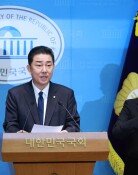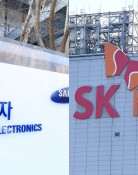Election Result Worries Public Enterprise Officials
Election Result Worries Public Enterprise Officials
Posted December. 22, 2007 05:41,
Following the election, those at the top management level in pubic enterprises who were appointed by order from the top based on their political network with the Roh administration are reportedly unsettled by the election result.
They landed jobs of public enterprise executives or auditors primarily because of their favorable role for the administration in past elections or because of their links with Cheong Wa Dae. Yet with the change to conservative rule for the first time in 10 years, it now becomes unclear whether they can finish up their respective terms, which is putting many in a position where they must worry about their next course of action.
In particular, given that President-elect Lee Myung-bak made a written promise that he would change the way public enterprises executives are appointed and work to place audit systems in good order, some expect a major reshuffle in personnel management in the near future.
Can I Finish My Tenure?
A survey of 24 major public enterprises including the Korea Electric Power Corporation indicates that some 80 percent of their past executives carry political, military or government bureaucratic backgrounds. The situation is not much different with regard to the current administration, which claims that there has been no case of solicited appointments based on personal networks.
Chung Sun-gyun, president of the Korea Broadcasting Advertising Corporation, was formerly a special press advisor to then presidential hopeful Roh Moo-hyun and Park Jae-ho, chairman of the board of directors to the Seoul Olympic Sports Promotion Foundation, was a special system advisor to candidate Roh. Former Chief Presidential Secretary of Public Relations Lee Baek-man and former Presidential Secretary for Legal Affairs and Civil Affairs Lee Yong-cheol have been appointed non-standing directors of the Korea Deposit Insurance Corporation.
With this type of executive appointments having been granted naturally during the Roh administration, major public enterprises have seen their debt rising by 74 percent. Yet at the same time, their numbers of staff have increased by 64 percent, thus inviting constant criticism over increasingly reckless management of public enterprises.
Higher ranking officials among public enterprises affiliated with the Ministry of Construction and Transportation said, Executives have a fixed term. Hence, they will not be made redundant. However, I doubt that they will continue to serve their jobs after their tenure given the extremely tense relationship between Cheong Wa Dae and the Grand National Party during the current administration.
Another public enterprise official said, Recently, my boss ordered the planning team to find out the members of Lee Myung-baks transition team. He seems to be very sensitive to what the next government is planning to do.
An executive with a political background now working for a public enterprise under the Ministry of Environment summarized his thoughts by saying, No credit (for establishing the new administration), no place of honor.
Other public enterprise officials under the Ministry of Environment, on the other hand, expressed their hope of continuing their jobs till the end of their tenure to finish ongoing projects. Because their tenure expires within one year, they do not think that finishing their term would be a problem.
A politician-turned public enterprise executive expressed his bitterness, As this presidential election not only changed the administration, but also brought about the change to the conservative rule, I think everyone is quite aware of, and prepared to face, what will follow.
Although not from a political background, those whose appointment processes were not much different from what their politician friends went through are also unsettled.
Park Se-heum, president of the Korea National Housing Corporation, is a Busan High School alumnus of former Presidential Senior Secretary on National Policy Byeon Yang-gyun, who has been marred by the Shin Jeong-ah scandal. Since his appointment, it has been said that key Cheong Wa Dae officials take special care of him, which convinces many that his destiny would follow that of the current administration.
The auditor of the Korea National Housing Corporation, who receives the same treatment as the president, is served by Seong Baek-yeong, former chairman of an Uri Party district chapter who was defeated in the 17th general election.
Auditors of public enterprises receive the same level of payments as presidents, yet their real jobs involve few substantial tasks. Their recent controversial trip to Iguazu Falls starkly revealed that the nature of their job is nothing more than nominal without the sense of their duty as a check on the public enterprises.
What Changes Might We Expect?-
As a former corporate chief executive who regards staff performance as a prime criterion for personnel management, many expect that President-elect Lee Myung-bak will overhaul public enterprise corporate governance in favor of it becoming more performance-oriented. It is expected that this would lead to greater personnel in public enterprises from business backgrounds rather than bureaucratic or political ones.
Some, however, are skeptical about the prospect of Lees complete departure from the previous practice. Lee has to give awards in some ways to those who helped him become elected. Thus, without fundamental changes in the personnel management system and practices, the planned reform might well have its own limitations.
Na Seong-lin, a professor at Hanyang University, said, however, With a business background rather than political one, Lee might have less people to claim credit for his election than President Roh, which means a lesser number of abnormal appointments.
He also said, The Roh administration has a system of publicly recruiting higher ranking public enterprise officials. Yet if the administration does not like candidates, they do not hire them. The urgent need is to put in place a performance-oriented appointment system.
From the beginning of the Roh administration, there has been mounting criticism that the recruitment process for selecting public enterprise officials are insignificant with successful candidates already selected behind-the-scenes.
Yoo Il-ho, a professor at Korea Development Institute School of Public Policy and Management, advised, Rather than relying on public offering, the public enterprise personnel appointment system needs to develop ways to select personnel of professional quality who can be held accountable for their conduct just as the government is. It is necessary to consider proper reward and punishment systems for public enterprises.



![‘건강 지킴이’ 당근, 효능 높이는 섭취법[정세연의 음식처방]](https://dimg.donga.com/c/138/175/90/1/wps/NEWS/IMAGE/2026/01/18/133181291.1.jpg)



